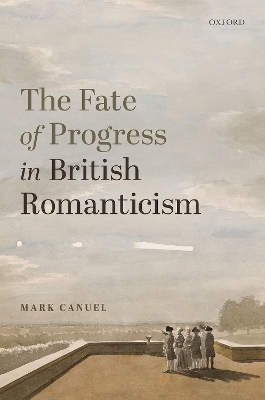
The Fate of Progress in British Romanticism
Seiten
2022
Oxford University Press (Verlag)
978-0-19-289530-1 (ISBN)
Oxford University Press (Verlag)
978-0-19-289530-1 (ISBN)
Explores the idea of progress in British Romantic literature by analyzing converging arguments among political theorists, historians, and writers of poems and novels from the 1770s to the 1820s to show how these writers reshaped dominant narratives about political progress.
What did Romantic writers mean when they wrote about "progress" and "perfection"? This book shows how Romantic writers inventively responded to familiar ideas about political progress which they inherited from the eighteenth century. Whereas earlier writers such as Voltaire and John Millar likened improvements in political institutions to the progress of the sciences or refinement of manners, the novelists, poets, and political theorists examined in this book reimagined politically progressive thinking in multiple genres. While embracing a commitment to optimistic improvement--increasing freedom, equality, and protection from injury--they also cultivated increasingly visible and volatile energies of religious and political dissent. Earlier narratives of progress tended not only to edit and fictionalize history but also to agglomerate different modes of knowledge and practice in their quest to describe and prescribe uniform cultural improvement. But romantic writers seize on internal division and take it less as an occasion for anxiety, exclusion, or erasure, and more as an impetus to rethink the groundwork of progress itself.
Political entities, from Percy Shelley's plans for political reform to Charlotte Smith's motley associations of strangers in The Banished Man, are progressive because they advance some version of collective utility or common good. But they simultaneously stake a claim to progress only insofar as they paradoxically solicit contending vantage points on the criteria for the very public benefit which they passionately pursue. The "majestic edifices" of Wordsworth's imagined university in The Prelude embrace members who are "republican or pious," not to mention the recalcitrant "enthusiast" who is the poet himself.
What did Romantic writers mean when they wrote about "progress" and "perfection"? This book shows how Romantic writers inventively responded to familiar ideas about political progress which they inherited from the eighteenth century. Whereas earlier writers such as Voltaire and John Millar likened improvements in political institutions to the progress of the sciences or refinement of manners, the novelists, poets, and political theorists examined in this book reimagined politically progressive thinking in multiple genres. While embracing a commitment to optimistic improvement--increasing freedom, equality, and protection from injury--they also cultivated increasingly visible and volatile energies of religious and political dissent. Earlier narratives of progress tended not only to edit and fictionalize history but also to agglomerate different modes of knowledge and practice in their quest to describe and prescribe uniform cultural improvement. But romantic writers seize on internal division and take it less as an occasion for anxiety, exclusion, or erasure, and more as an impetus to rethink the groundwork of progress itself.
Political entities, from Percy Shelley's plans for political reform to Charlotte Smith's motley associations of strangers in The Banished Man, are progressive because they advance some version of collective utility or common good. But they simultaneously stake a claim to progress only insofar as they paradoxically solicit contending vantage points on the criteria for the very public benefit which they passionately pursue. The "majestic edifices" of Wordsworth's imagined university in The Prelude embrace members who are "republican or pious," not to mention the recalcitrant "enthusiast" who is the poet himself.
Mark Canuel is Professor of English and Director of the Institute for the Humanities at the University of Illinois at Chicago. He is author of Justice, Dissent, and the Sublime (Johns Hopkins, 2012), as well as other books and articles on Romantic literature, political theory, and aesthetics.
Introduction: Rouzing the Faculties
1: The Forms of Romantic Progressivism
2: Thomson, Barbauld, and the Progress of Liberty
3: Hope, Politics, and The Prelude
4: How Shelley Moves
5: Lyric Progressivism
6: The Romantic Novel and the Progress of Civilizations
Conclusion: The Fate of Romantic Progressivism
Bibliography
| Erscheinungsdatum | 11.04.2022 |
|---|---|
| Zusatzinfo | 7 Illustrations |
| Verlagsort | Oxford |
| Sprache | englisch |
| Maße | 164 x 241 mm |
| Gewicht | 540 g |
| Themenwelt | Geisteswissenschaften ► Sprach- / Literaturwissenschaft ► Anglistik / Amerikanistik |
| Geisteswissenschaften ► Sprach- / Literaturwissenschaft ► Literaturwissenschaft | |
| Sozialwissenschaften ► Politik / Verwaltung ► Politische Theorie | |
| ISBN-10 | 0-19-289530-3 / 0192895303 |
| ISBN-13 | 978-0-19-289530-1 / 9780192895301 |
| Zustand | Neuware |
| Haben Sie eine Frage zum Produkt? |
Mehr entdecken
aus dem Bereich
aus dem Bereich
Poetik eines sozialen Urteils
Buch | Hardcover (2023)
De Gruyter (Verlag)
59,95 €
Entzauberung und Faszination des Immergleichen in Literatur und Film
Buch | Softcover (2024)
Springer Fachmedien Wiesbaden GmbH (Verlag)
84,99 €
Buch | Softcover (2024)
belleville (Verlag)
20,00 €


